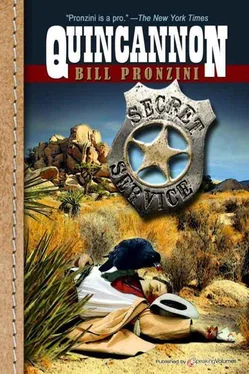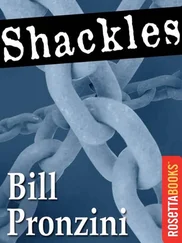Bill Pronzini - Quincannon
Здесь есть возможность читать онлайн «Bill Pronzini - Quincannon» весь текст электронной книги совершенно бесплатно (целиком полную версию без сокращений). В некоторых случаях можно слушать аудио, скачать через торрент в формате fb2 и присутствует краткое содержание. Жанр: Криминальный детектив, на английском языке. Описание произведения, (предисловие) а так же отзывы посетителей доступны на портале библиотеки ЛибКат.
- Название:Quincannon
- Автор:
- Жанр:
- Год:неизвестен
- ISBN:нет данных
- Рейтинг книги:5 / 5. Голосов: 1
-
Избранное:Добавить в избранное
- Отзывы:
-
Ваша оценка:
- 100
- 1
- 2
- 3
- 4
- 5
Quincannon: краткое содержание, описание и аннотация
Предлагаем к чтению аннотацию, описание, краткое содержание или предисловие (зависит от того, что написал сам автор книги «Quincannon»). Если вы не нашли необходимую информацию о книге — напишите в комментариях, мы постараемся отыскать её.
Quincannon — читать онлайн бесплатно полную книгу (весь текст) целиком
Ниже представлен текст книги, разбитый по страницам. Система сохранения места последней прочитанной страницы, позволяет с удобством читать онлайн бесплатно книгу «Quincannon», без необходимости каждый раз заново искать на чём Вы остановились. Поставьте закладку, и сможете в любой момент перейти на страницу, на которой закончили чтение.
Интервал:
Закладка:
The mountain air was cold, crisp, but the sun had taken the edge off the night’s chill. Up the slopes of War Eagle, the mica particles in the long drifts of greenish-white tailings caught the sunlight and made the drifts glisten like new snow. Jordan Street was as crowded as it had been last night, though with a different sort of activity. Ore wagons, empty and laden both, rattled up and down the steep incline, on their way to and from the mines; mingled with them were broughams, buckboards, and freight wagons carrying machinery, produce, hides, scores of other products. Swampers and merchants worked busily at the storefronts, preparing to open their various establishments for the day.
Powder blasts in the mines added rolling thunder echoes to the morning din as Quincannon made his way to the Wells Fargo office, where the Western Union telegrapher was housed. He wrote out a message to Boggs, paid for it, and asked that it be sent immediately. It read:
TO ARTHUR CALDWELL, CALDWELL ASSOCIATES, PHELAN BLDG, SAN FRANCISCO
ARRIVED LAST NIGHT STOP PROSPECTS APPEAR GOOD EXCEPT PRINCIPAL YOUR AGE COMMA NATIVE THIS AREA COMMA AND IN SAME BUSINESS YOUR NEPHEW CHARLES STOP WIRE DETAILS SOONEST STOP DO YOU KNOW TOWN MARSHAL WENDELL MCCLEW QMK HE MAY BE OLD FRIEND OF YOURS BUT AM NOT SURE STOP WILL COMMUNICATE AGAIN WHEN HAVE NEWS OR HAVE MADE IMPORTANT SALE
ANDREW LYONS
Boggs’ nephew Charles had worked as a cowhand for a variety of cattle ranches in Texas, before a horse threw him one day in 1886 and broke his neck. Boggs would understand the necessity for more information on Whistling Dixon, and step up his own inquiries into the man’s background. He would also understand Quincannon’s uncertainty about McClew and pursue a line of inquiry into the marshal’s background as well.
From the telegrapher Quincannon learned that there were two drugstores operating in Silver and that the nearest was on Washington Street above the courthouse. He went to that one by way of Avalanche Avenue, a deliberate route that took him past Sabina Carpenter’s millinery shop. The shop occupied the upper floor of a building above a tonsorial parlor, and was still closed. Most of the other business establishments were already open for the day, including the barber’s; he wondered why she had not yet opened hers. It annoyed him that she was a mystery he had so far been unable to solve. Annoyed him, too, that he should be bothered, made uncomfortable by her. That damned resemblance to Katherine Bennett…
At the drugstore he spent fifteen minutes convincing the pharmacist to buy six cases of Dr. Wallmann’s Nerve and Brain Salts. The man was skeptical at first; he had shelves full of such patent medicines, he said, and had difficulty selling those. Quincannon allowed him to buy the six cases at “a special reduced rate,” just so Andrew Lyons could claim the sale.
Outside again, he started down toward the courthouse, with the intention of finding the second drugstore. But he had gone less than half a block when a light spring wagon came clattering out of one of the side streets ahead and veered over to the courthouse. The middle-aged and bespectacled driver brought his horses to a stop near a sign that said JAIL, jumped down, and began yelling excitedly, “Marshal! Marshal McClew!” even before he disappeared inside the jail.
From where he stood uphill Quincannon could see into the back of the wagon; a bulky shape wrapped in canvas had been roped to one of the sides. He crossed the street, reached the wagon just as the driver and a tall, mustachioed man wearing a plug hat and a marshal’s badge pinned to his cutaway coat came rushing out. The driver was saying, “Found him out in Slaughterhouse Gulch, Marshal. What a sight for a man to come on before breakfast!”
“Shot, you say?”
“See for yourself.”
The bespectacled man moved to untie the ropes. Quincannon stepped closer, along with half a dozen others who had been attracted by the brief commotion. The ropes came loose; a stained flap of the canvas was thrown back.
The body inside was that of a man dressed in rough trail garb — a gray-haired, grizzled man of about sixty. His lower jaw had been shot away, but evidently there was still enough of his face intact for identification purposes.
“Well, hell and damn,” the plug-hatted man said. “Now who would want to shoot a harmless old waddy like Whistling Dixon?”
Chapter 5
Quincannon moved a step closer to the wagon. The crowd of onlookers had grown; an excited buzzing ran among the men, like the sound of disturbed bees.
The wagon driver said, “Maybe it was robbery. Outlaws all over these mountains, you know that.”
Marshal McClew made a snorting noise. “Whistling Dixon never carried more than a dollar in his life, and that’s a fact.”
“Outlaws don’t know it.”
“Were you an outlaw, Henry, would you pick him as a target?” McClew ran a thoughtful finger over each of his mustaches. “Found him in Slaughterhouse Gulch, you said. Whereabouts?”
“By that stand of willows where the creek branch runs through. I wouldn’t have seen him, back under the trees, except the crows was at him.”
“Didn’t get his eyes, at least. Sign of his horse?”
“No.”
“Anybody else around?”
“Didn’t see anybody.”
McClew lifted the dead man’s arm, let it fall again limply. “Rigor mortis has come and gone,” he said. “Been dead a while. Since early last night sometime.”
“Bushwhacked, probably. Has to be outlaws, Marshal.”
“Maybe,” McClew said. “Maybe.”
“Well, what you want done with the body?”
“Take it up to Turnbuckle’s. I’ll go with you. Then we’ll notify Doc Petersen, and you can run me out to Slaughterhouse Gulch.”
“Me? Hell, I’m already late for work at the livery…”
“Can’t be helped. I need you to show me just where you found him.”
The driver, Henry, climbed grumbling to the wagon seat. McClew started around to the other side, seemed to notice the gathering crowd for the first time, and stopped. “You men — go on about your business. This ain’t a public meetingplace. Disperse. Move along!”
Whether he was liked or not, his words carried weight in Silver City: the crowd immediately began to break up. McClew took his place next to Henry, who snapped the reins and brought his team around and out onto Washington Street. As the wagon rattled away uphill, Quincannon asked one of the men walking near him, “Would Turnbuckle’s be an undertaking parlor?”
“It would. Opposite the brewery, two blocks up.”
Quincannon walked half a block in that direction, until he came to a saloon. Inside at the plank bar he spent five minutes with a shot of whiskey, timing it by the gold stemwinder his father had given him on his twenty-first birthday. Then he went out again and climbed toward the barnlike building that housed Silver’s own brewery, marked by a blackened brick chimney belching smoke.
Opposite the brewery was a squat building with a facade of white-painted fretwork and a sign that read: N.R. TURNBUCKLE, UNDERTAKER AND CASKET MAKER. The street in front was empty; so was the rutted and weed-choked alleyway that ran alongside. There was no sign of Henry’s light spring wagon.
Quincannon ran hard across the street to the undertaking parlor, a ploy to quicken his breathing, and opened the front door to the melody of a little bell. Inside was a hallway and, to one side, a large room with rows of benches and a bier at one end — the place where funeral services were held. A door at the rear of the hall opened momentarily and a small, dapper, balding man emerged and came toward him. Except for his eyes, the man’s face was expressionless and might have been molded of soft white clay. The eyes were the saddest Quincannon had ever seen.
Читать дальшеИнтервал:
Закладка:
Похожие книги на «Quincannon»
Представляем Вашему вниманию похожие книги на «Quincannon» списком для выбора. Мы отобрали схожую по названию и смыслу литературу в надежде предоставить читателям больше вариантов отыскать новые, интересные, ещё непрочитанные произведения.
Обсуждение, отзывы о книге «Quincannon» и просто собственные мнения читателей. Оставьте ваши комментарии, напишите, что Вы думаете о произведении, его смысле или главных героях. Укажите что конкретно понравилось, а что нет, и почему Вы так считаете.












